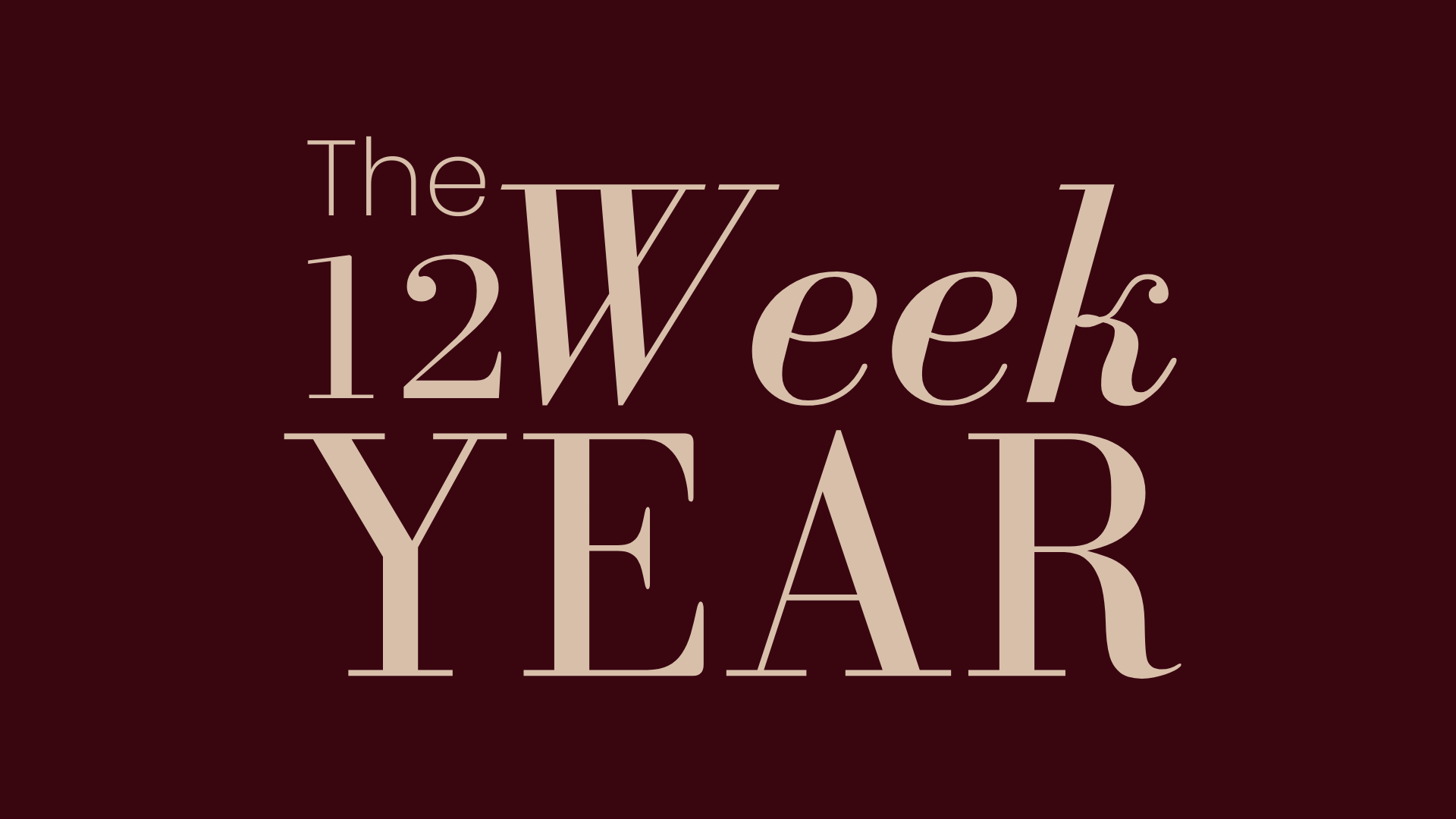Do more in 12 weeks than most people do in a year with ‘The 12 Week Year’
Rethink time and do 4x more for your personal brand than others.
Could you dare to rethink your concept of time? And if you did, how could it power your performance and personal brand?
A not so crazy idea…
The idea of rethinking time isn’t as outrageous as it sounds. Historically, humans love it. We have been doing it for thousands of years.
The Gregorian calendar is most widely used today. But, it only began with Pope Gregory X111 in 1582.
Ancient Egypt had a 12-month calendar of 30 days each. It had five additional days at the end of the year, totalling 365 days. It was used for thousands of years in ancient Egypt.
The Maya civilization in Mesoamerica had a highly sophisticated Maya calendar system. This included several cycles, one of which was the Haab calendar. It consisted of eighteen months of twenty days each. It also had an additional five-day month called the ‘Wayeb’.
All calendars have been grounded in their own theories. But, the point is, time is in many ways a made-up construct. So, why not rethink it for yourself too?
Enter the 12 Week Year
Brian P. Moran and Michael Lennington’s The 12 Week Year challenges you to think differently. So you act differently by default. It dares you to redefine time as you know it.
12 weeks is not a quarter of the calendar year. It is the year. Forget annualised thinking and think in 12-week years.
Here are my top takeaways from The 12 Week Year. Plus, how I personally put them into practice.
1. Urgency over complacency
The 12 Week Year re-generates the gusto that comes with end-of-year motivation. And it applies that to your whole year.
The goal is focused execution, sprinkled with a sense of urgency.
By default, The 12 Week Year curtails complacency. It stops any sense of having plenty of time - the mindset 12-month calendar creates:
“At the heart of annualized thinking is an unspoken belief that there is plenty of time in the year to make things happen. In January, December looks a long way off.”
What the authors are essentially linking to is what social psychologists call a ‘temporal landmark’. Humans navigate space using landmarks. And, we also use time to help us travel our paths. It’s why you likely feel differently at the start and end of each calendar year.
In The 12 Week Year, the authors say:
“What is it about year-end? Why do people behave differently in November and December than they do in July and August? Inevitably, it is because there is a deadline, which for most people is December 31. The end of the year represents a line in the sand, a point at which we measure our success or failure. Never mind that it’s an arbitrary deadline; everyone buys into it. It is the deadline that creates the urgency.”
So, if the deadline is arbitrary, why not set more meaningful ones for yourself?
2. What gets measured, gets managed
The tighter time frame of your 12 Week Year increases your laser focus. It gives you crystal clear clarity in your weeks and days. This weekly planning is not your glorified to-do list. It’s accountability to your top strategic priorities. The things that will actually move the needle. For each goal in your 12 Week Year, there are tactics. Because, too often people focus their goals on the what and not also the how.
Your plan is then broken down into weeks. It’s underpinned by a system of weekly review and planning. The authors suggest spending 15-20 minutes on your 12 Week Year plan each week. Reviewing your progress from the past week and planning the next one.
The weekly system of review then informs your weekly scorecard. Achieving 85% of your weekly plan is the benchmark.
For your weekly tracking, assess your actual performance against your KPIs. Use a colour-coded system to help you. The key with your goals, tactics and KPI is to prioritise lead, not lag indicators. That being, what you can control. So, if the goal was more sales, the focus is tactics that create this.
Remember, you can adjust accordingly. The goal of your plan is not to be held hostage to it. But, to create consistent accountability and review. With any good review comes adjustments as you adapt to your changing environment.
The 12 Week Year is a mindset for high-powered productivity. But, it’s not designed to have you feeling stuck on a hamster wheel. After every 12 Week Year, it recommends a one-week break before the next year. Let’s for just a moment, consider time conventionally again. This means in a 12-month calendar year, you’ll have four one-week breaks. The perfect chance to reset, reimagine and recreate.
3. Big rocks, small pebbles
I like to plan my 12 Week Year with a ‘big rocks, small pebbles’ mindset. This is a metaphor to focus on the most important tasks. For example, say you fill a jar with small pebbles first. Then, you might not have room for the big rocks. Instead, you fill it with the big rocks first. The small pebbles can then fall around the big rocks (your most important priorities).
Your 12 Week Year should already be structured around our most important strategies. However, I like to ensure there’s one particularly ‘big rock’ goal and tactic included.
This has included things like launching my blog, YouTube channel and podcast. For your personal brand, your big rock helps signal to the marketplace. It demonstrates that you’re serious about the path you’re on. And perhaps. beginning the next era of your business or personal brand.
After a big rock becomes a routine task, remember to shift your mindset around it. In your next 12 Week Year, don’t treat your big rock with a routinised approach. This avoids becoming complacent. It keeps your 12 Week Year plan from pivoting into a task list. Just think about personal brand or businesses that start the calendar year with a bang. As the year progresses, they often start to feel more lacklustre.
It’s okay if your previous big rock remains a priority in your next plan. It’s likely beneficial to stay focused on the most meaningful tasks. But, ask yourself: what’s the next strategy to elevate your focus in this area?
If your personal brand or business is not continuously evolving, it risks replication. Instead, think like Warren Buffet who advocates for building a moat around your competitive advantage.
Don’t forget you can also build your big rock under the radar. Maybe, it’s a skill you’re supercharging or a stealth strategy invisible to others.
As the saying goes:
“When you build in silence, they don’t know what to attack.”
What matters most is what your top priorities signal to you personally. And to the universe. It’s often said that when you signal to the universe that you’re serious about something, the universe will respond.
4. Keep your plans where you can see them
It’s too easy to forget your elaborate business or personal brand plans. We place them in drawers or keep them filed away.
My 12 Week Year plan is the only file I keep consistently on my desktop. When shiny distractions try to steal my attention, it’s a regular reminder of what’s important.
5. Think outside traditional calendar year quarters
My 12 Week Plan is based on timeframes like Jan-Mar etc. And contains my top priorities. However, I also plan, albeit much less formally, around the physical seasons too.
I’ve recently started creating Pinterest boards on the first days of the new season. This includes foods I want to eat, new recipes and other personal ideas. It gives me an outlet to set goals that just bring me joy. Goals for my personal time that aren’t as pressing. All, while moving with the seasons, the environment and the mood each season brings. When I combine this with my more formal 12 Week Year, this means I get that fresh start feeling at least eight times each calendar year.
So, what are your goals for next year?
PS. For more ways to get that fresh start-of-year feeling all year round, check out my earlier blog.





